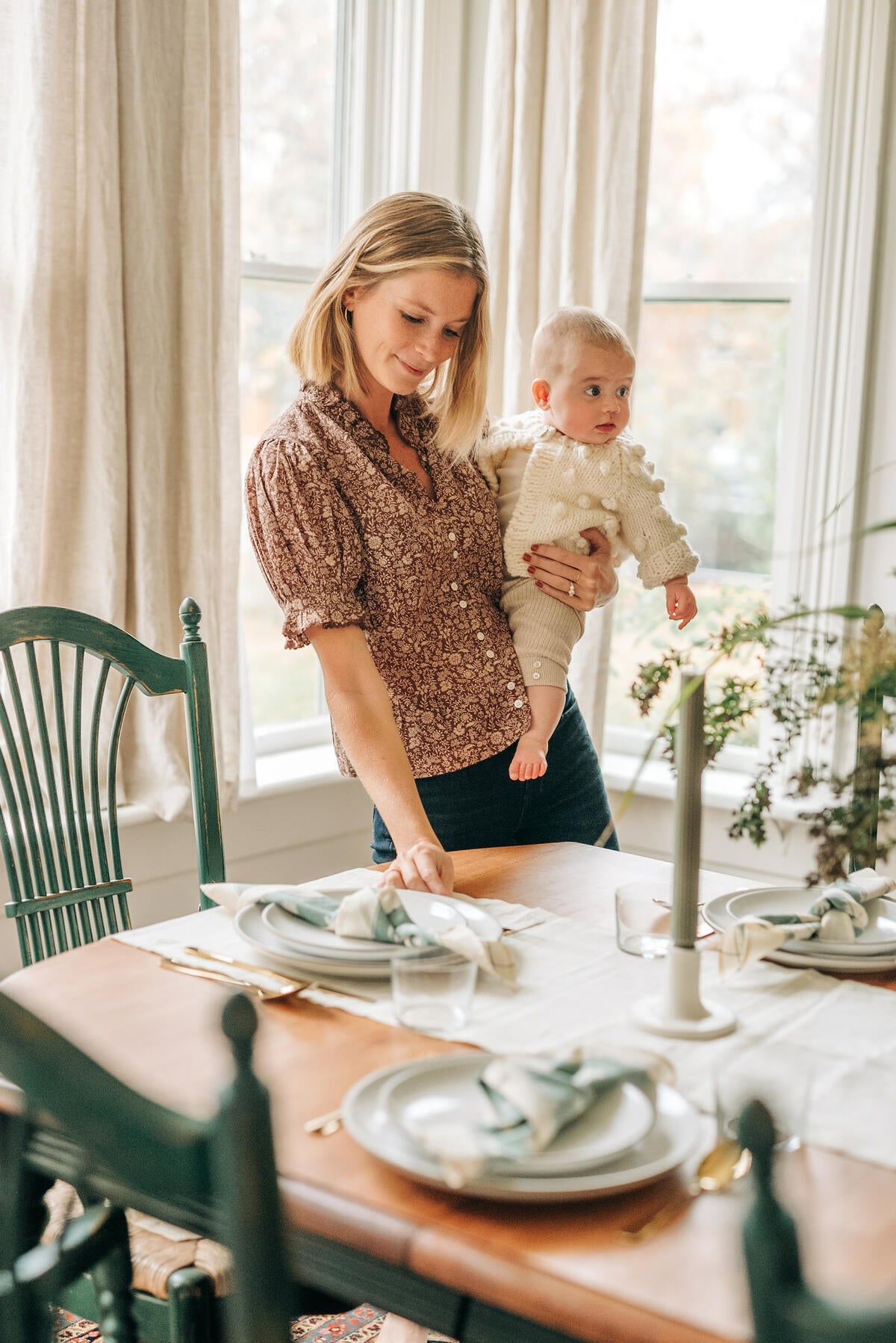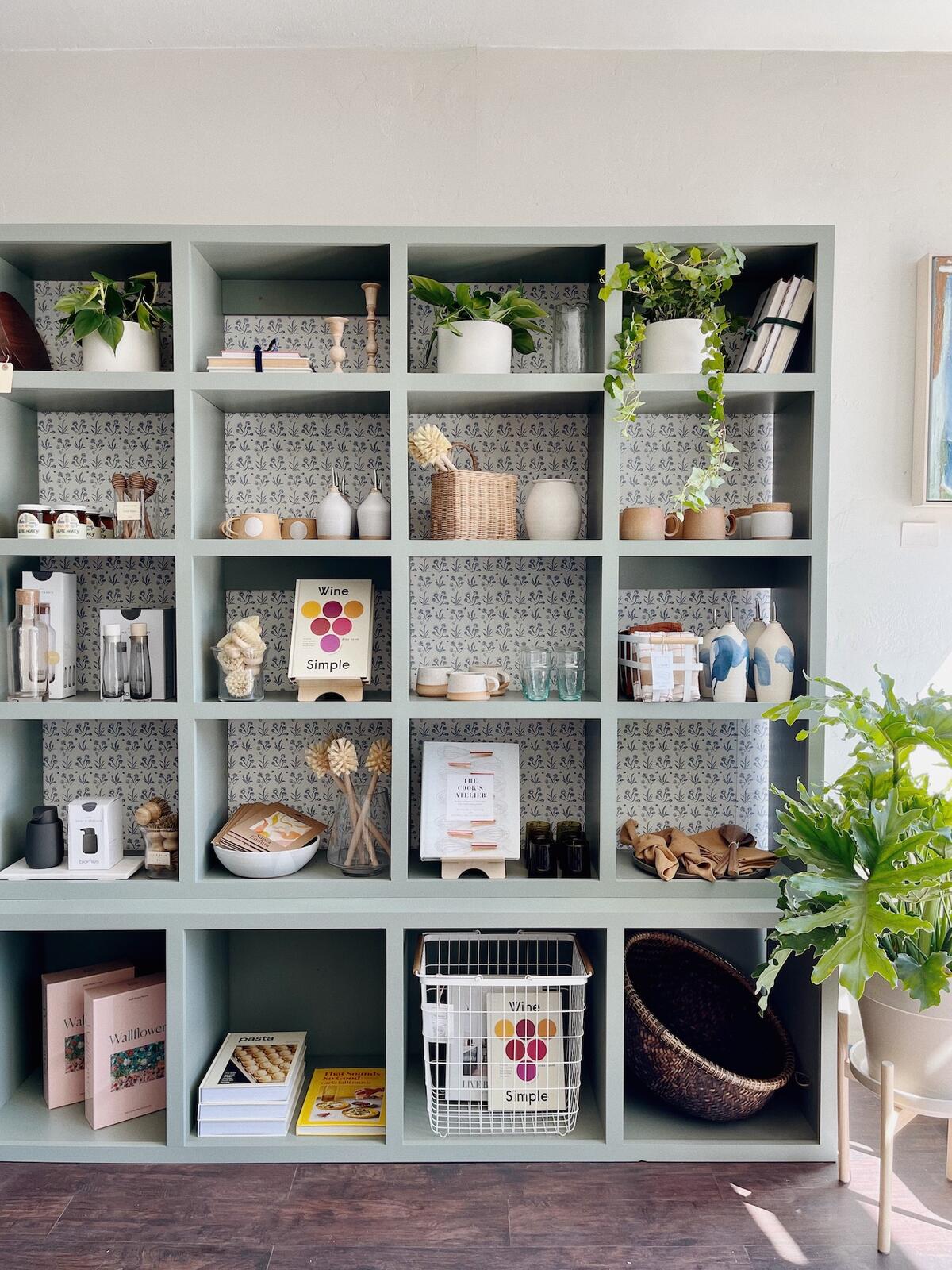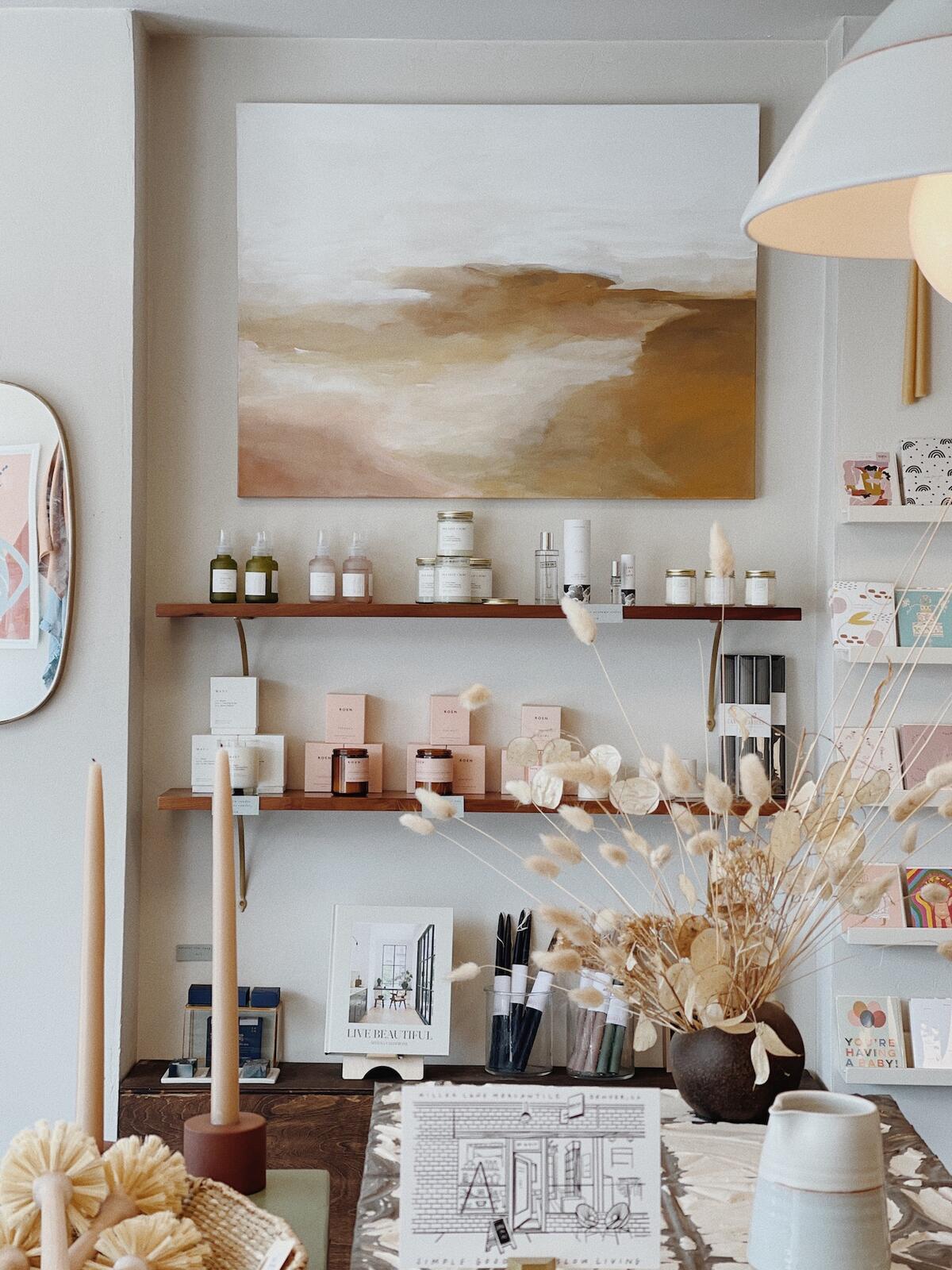In Business of Home’s series Shop Talk, we chat with owners of home furnishings stores across the country to hear about their hard-won lessons and challenges, big and small—to find out what they see for the future of small businesses like theirs. This week, we spoke with Calli Swofford, the owner of Miller Lane Mercantile in Denver. Her background is in digital and events marketing, but in high school and college she worked in several retail shops.
“Even at a super early age, I was very drawn to small business and I loved the idea of one day opening a shop,” says Swofford, who grew up on Long Island and previously lived in New York. “After moving to Denver with my husband in 2015, I just felt like the city was so welcoming of small businesses, and there were a lot of women-owned shops here. That inspired me and gave me that little push I needed to open my own.” Ahead, she shares her thoughts on serving other transplants like herself, hiring entrepreneurial staff and the allure of beautiful olive oil dispensers.

What inspired the store? Was it something you felt Denver needed?
When we first moved, I always felt that whenever I needed a wedding or housewarming gift, there weren’t go-to shops. Coming from New York, which is the capital of that kind of small shop, it was surprising to me. One day, my husband and I were walking the neighborhood and I saw a for-lease sign outside of this really cute brick storefront. I just said, “Alright, I’m going to reach out to them and get the ball rolling.” If I wanted it in the neighborhood, I thought that other people would appreciate it, too.
What’s the vibe of the store?
I grew up in the Hamptons, so I pull a lot of inspiration from that side of the country. I think when people come in, they definitely get an East Coast vibe. The style that I try to convey is warm but refined. It’s not anything super modern. We bring in a lot of wooden accents and neutral tones with nice pops of color.
Who is your typical customer?
This neighborhood is becoming known for being family-oriented—there are a lot of young couples. Almost every day, I’m meeting people who have just moved from the Bay Area or Brooklyn. That’s definitely our main customer: neighborhood folks who are walking distance and visit on their way home from work or while taking the dog for a walk. We also work with a lot of interior designers and people who do gifting through their profession—realtors who want to put together gift boxes for closings and that sort of thing. We also get a good number of out-of-towners who are visiting Denver for weekend trips. I always feel really honored when people have Miller Lane on their to-do list when they come into town.
On May 21, award-winning nursery and children’s room designer Naomi Coe shares her insights on creating spaces that are not just kid-proof but kid-approved. Click here to learn more and remember, workshops are free for BOH Insiders.
Tell me about a favorite vendor of yours.
A local potter—his name is Sean [VanderVliet], and his company is Fenway Clayworks. We’ve been working with him since the beginning, and I think his pottery fits into the shop in such a seamless way. People will often say, “Oh, is this your pottery line?” It just perfectly emulates the aesthetic of our shop. We usually stock his bowls, ceramic vases and mugs, and those are all bestselling pieces for us.
What’s one of your favorite items in the store? Something that makes you smile every time you walk past it?
We carry these beautiful knitted blankets. The artist’s name is Hillery Sproatt, and she is based in California. She makes these beautiful paintings and then translates them into knitted blankets, so each is such a work of art. They’re pieces that almost everyone comments on when they come in—it’s hard to walk by and not pick one up and ask questions.
What’s a product you can barely keep in stock?
There’s an artist out of Austin, and her company is called Settle Ceramics. She makes these gorgeous ceramic olive oil pourers. When I put an order in, I always feel like, “OK, that was a big order. We’re going to be stocked for a while,” and I’m amazed at how quickly they sell, especially around the holidays. You might not necessarily buy one for yourself, and that’s why it makes such a beautiful gift. Everyone uses olive oil. It’s something that you can keep out on your counter and just admire in the kitchen.

What is your sourcing process like?
I love going to trade shows in person. So much of retail is that sensory experience, touching things and getting to see the quality firsthand. It really can’t be replicated by just looking at a line sheet on your computer. I’ve attended Shoppe Object and NY Now in New York a couple of times, but with the pandemic, shows halted for a bit, which forced small business owners to get creative with that sourcing process.
I personally turned to Instagram for smaller, independent makers. Oftentimes, they don’t have any other retailers in the state of Colorado when I start talking to them. Jewelry designers, textile designers, potters—we’ve had great success finding those types on Instagram, so that’s a tool that I rely on heavily. I also use some of the online platforms, predominantly Faire. There are positives and negatives to platforms like that. The positives: It makes it so easy to order. I have the Faire app on my phone, and oftentimes, before bed, I’ll be in there, like, “Oh, I really wanted to reorder this thing.” In three minutes, it’s done. And depending on the membership, they’ll offer free shipping, [which is great] for a shop like mine, because shipping can get super expensive when you’re talking about pottery or candles—these heavier, fragile items. But the negative is that you see a lot of the same brands being carried by shops across the country, so it feels a little bit less unique. So it’s about diversifying where you’re finding your inventory and not necessarily getting it all at a trade show or all on one of these online platforms.
What is your approach to e-commerce, and how has it changed?
I didn’t launch the store with an e-commerce shop. That was really intentional: I had worked in e-commerce in the past, and I was a little bit burnt out. I thought, “OK, let me launch the shop in person and really home in on the in-person experience. The e-commerce will come later.” Once I got my footing, I started working on the online shop, and it happened to be ready to launch the same week that the pandemic hit. I couldn’t have timed that better if I tried. That really kept us afloat when our storefront was closed for those months. I had a local delivery service option on the website, so if people were within five miles of the shop, I was hand-delivering to them.
Having infrastructure to do e-commerce is important, especially in the times we’re in now. It’s a great security blanket to fall back on and to reach people outside of your community. But it is a ton of work to get it set up. For the most part, I photograph everything myself. And it is a small fraction of our total sales. But it’s still really important to keep that aspect of the business.

How do you handle it when customers see your merchandise in store, and then note the brand or take a photo of it and go buy it online for cheaper? Is that in your head?
Totally. It’s something that I struggle with. Recently, I had somebody call the shop and say, “I saw these great wooden children’s toys that you had. Can you tell me the brand?” I wanted to say, “Why don’t you just go to our website, and you can order them there?” She was probably looking to see if she could find them online with free shipping. I understand that—I’m a consumer, and I, too, love free shipping. But our margins just can’t support that. I’ve had some other shop owners phrase it to me that they felt like their store was kind of a showroom, which is frustrating. You don’t want to feel like that—that you’re a showroom to inspire people to then go buy at a better price somewhere else. Everybody struggles with it in one way or another.
How are you handling inflation?
I think inflation is one of those necessary evils. I definitely do see it with a number of my vendors raising their wholesale costs, and we have to then increase what we’re selling it for in the shop. If the new price is unjustified, then I might pause on reordering it. I just put myself in my customer’s shoes: Do I think this is a fair price? Would I want to pay this price? And you know, the majority of the time, I think it is justified. And I think people understand that costs are inevitably going up.
Another pandemic-era problem: Have you had any difficulties finding and retaining staff in recent years?
We’ve been fortunate to have an amazing staff sticking through with us during this time. I think the reason is, well, one, we’re a small shop and I don’t have any full-time employees. We have a couple of part-time employees, and we all take a couple shifts a week. But most of them are entrepreneurs themselves, and they have their own side businesses. They might work at the store a few days a week to supplement some income. For them, it’s really important to be public-facing, constantly meeting people in the community where they’re able to then share about their own businesses.
For example, one of the ladies is a postpartum doula. In our neighborhood, there are tons of new young families and she was able to organically strike up conversation with them while she was working at Miller Lane. She was definitely able to grow her clientele. We’ve got another employee who does holistic coaching; another one that has her own jewelry line. I love the fact that everyone’s got their own thing going on, and I think because of that, they find it really valuable to be in the store a few days a week.

Do you ever think about taking the business in another direction—interior design, events, another location?
Absolutely. It’s something I think about constantly, because our space is very small, about 500 square feet, so I’m limited in what I’m able to carry here. [At] a bigger location, I might be able to carry vintage furniture or more artwork. That’s in my five-year plan. Something I’m excited about right now is starting to explore in-house collections. I just went to L.A. to source fabric for a table linen collection exclusive to Miller Lane that I’ve designed and am hoping to roll out before the holidays. Always having something new that you’re learning and striving for—it just keeps things interesting.
Is there advice that you would give yourself if you could go back to opening day?
You don’t have to be as polished and professional as you think. When I first opened, I wanted to seem so professional and buttoned up, but I think people really love to see the humanness behind a company, especially a small business. They like seeing your face and they like knowing who they’re supporting. That builds community—highlighting those things rather than masking, trying to seem bigger than you are.
Homepage photo: The store sells olive oil dispensers from Austin-based company Settle Ceramics | Courtesy of Miller Lane





























